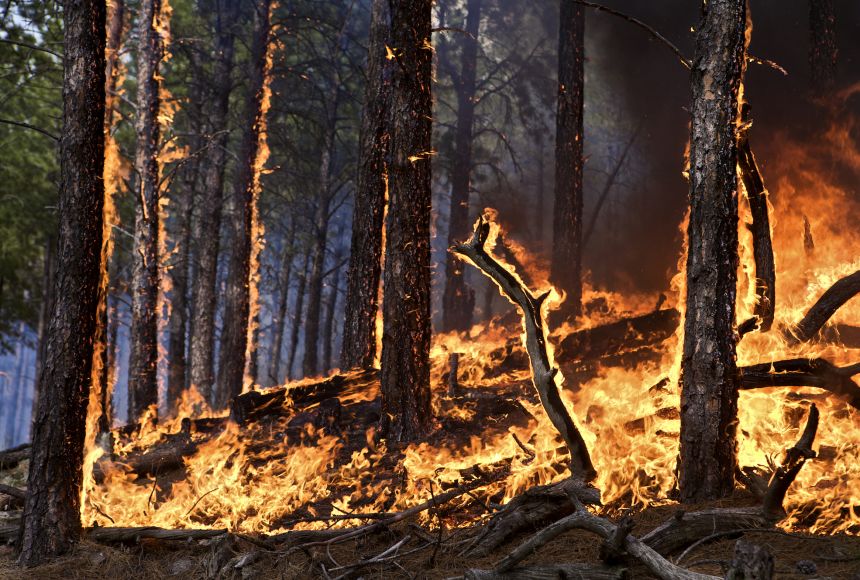
English below
Лісові пожежі мають негативний вплив на всі компоненти природних екосистем: викликають забруднення атмосферного повітря, ґрунтів, поверхневих і підземних вод, втрат біорізноманіття. В умовах кліматичної кризи підвищується ризик виникнення пожеж і втрати великих площ лісонасаджень, що викликає загрози негативних змін в природних екосистемах.
Пожежі є причиною зниження водорегулючої, ґрунтозахисної, санітарно – гігієнічної, кліматичної, природоохоронної та протиерозійної ролі лісу в природних екосистемах. Знищення пожежами прибережних лісів призводить до обміління річок та швидкого розмиву їх берегів.

При лісових пожежах і вирубці лісів, крім порушень водного балансу екосистеми річкового басейну, виникають певні зміни й у біотичному балансі, круговороті біогенних елементів, переривається річний цикл обігу поживних речовин не тільки в лісі, але й в інших підсистемах басейну. Органічна речовина зазнає розкладання, інтенсивність якого різко збільшується завдяки більш теплій і вологій підстилці. Відмирання кореневих систем дерев після їхньої вирубки приводить до зниження інтенсивності поглинання ними мінеральних елементів. Роль дерев у процесах перехоплення біогенів, опадів різко знижується, збільшується відкритий стік і вилужування біогенів за рахунок води, що просочується, тобто змінюється якісний вміст стоку. Наслідком цього є збільшення інтенсивності водної і вітрової ерозії. В результаті, якщо підсистеми лісу і річки розташовані в безпосередній близькості, кількість розчинених речовин, яка виносяться з підсистеми лісу, різко зростає, що приводить до підвищення їхнього вмісту в річкових водах. Якщо ж ліс розташований на схилах, то винесена звідти речовина практично не повертається назад, полишаючи межі екосистеми басейну даної річки.
Через російську військову агресією пожежна небезпека в лісових екосистемах значно зростає. Близько 450 тисяч га лісів знаходяться під окупацією, наразі 2, 45 млн га лісів та 27 лісгоспів звільнено з-під окупації та потребують відновлення.

Impact of fires on forest ecosystems
Forest fires have a negative impact on all components of natural ecosystems: they cause pollution of air, soil, surface and groundwater, loss of biodiversity. In the context of the climate crisis, the risk of fires and loss of large areas of forest plantations increases, which causes threats of negative changes in natural ecosystems.
Fires cause a decrease in the water regulation, soil protection, sanitary and hygienic, climatic, environmental and erosion control role of forests in natural ecosystems. Destruction of coastal forests by fires leads to shallowing of rivers and rapid erosion of their banks.
Forest fires and deforestation, in addition to disrupting the water balance of the river basin ecosystem, cause certain changes in the biotic balance, nutrient cycling, and interrupt the annual cycle of nutrient turnover not only in the forest but also in other subsystems of the basin. Organic matter undergoes decomposition, the intensity of which increases dramatically due to warmer and wetter litter. Dying off of the root systems of trees after their felling leads to a decrease in the intensity of their absorption of mineral elements. The role of trees in the processes of interception of biogens, precipitation is sharply reduced, open runoff and leaching of biogens due to infiltrating water increases, i.e. the qualitative content of the runoff changes. The consequence of this is an increase in the intensity of water and wind erosion. As a result, if the subsystems of the forest and the river are located in close proximity, the amount of dissolved substances that are taken out of the forest subsystem increases dramatically, which leads to an increase in their content in river waters. If the forest is located on the slopes, the substance taken from there practically does not return back, leaving the ecosystem of the river basin.
Due to the Russian military aggression, the fire hazard in forest ecosystems is significantly increasing. About 450 thousand hectares of forests are under occupation, currently 2.45 million hectares of forests and 27 forestries have been released from occupation and need to be restored.
